Iran Executed 423 People In 2023
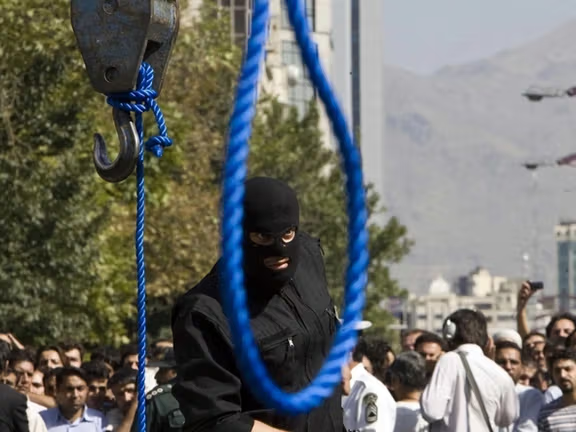
Human rights groups said Wednesday that at least 11 Baluch citizens were executed during the past three days, bringing the number of hangings to 423 in Iran in 2023.

Human rights groups said Wednesday that at least 11 Baluch citizens were executed during the past three days, bringing the number of hangings to 423 in Iran in 2023.
Advocacy group Haalvsh, which reports on issues affecting the Baluch minority, said the executions were carried out in several prisons in the southwestern Sistan-Baluchestan province and the northeastern city of Birjand.
The report added that none of the prisoners – who had been sentenced to death over drug-related charges --had their final meeting with their families, “and the families have only been called to receive the bodies of their loved ones."
According to the Norway-based Iran Human Rights (IHRNGO),423 people – including 10 women -- were executed since the beginning of 2023.
In July, the US-based Human Rights Activists in Iran (HRANA) released a report saying that approximately 5,000 executions have taken place in Iran in the last 10 years.
With many cases of executions not officially reported, the actual number is undoubtedly higher.
According to a HRANA report, the number of executions increased by over 88 percent in 2022 compared with a year earlier. There was a sharp rise in reported human rights violations since mid-September when the 22-year-old Kurdish woman Mahsa (Jina) Amini died in the custody of the so-called 'morality police' following which protests swept across the country.
As the execution wave shows no signs of slowing, protests continue across the country, only fueled by the relentless crackdowns.
Amid a spike in executions since late April, on May 19, authorities arbitrarily executed three tortured protesters, Majid Kazemi, Saeed Yaghoubi and Saleh Mirhashemi who were convicted and sentenced to death in Esfahan without due process of law.
The deaths brought to at least seven the number of protesters hanged since nationwide protests broke out in September 2022 following the death in custody of 22-year-old Mahsa Amini.

Renowned satirist Shaker Bouri has been arrested by intelligence agents in Iran.
The arrest took place on July 31, and since then, there has been no information about his whereabouts or condition.
According to a statement from the Dadban Legal Education and Counseling Center, activists in Khuzestan province reported that Bouri disappeared after he visited the intelligence department of Abadan to collect his mobile phone after plainclothes forces previously raided his home, confiscated his cell phone, and took him away.
Bouri gained popularity on social media for his humorous yet pointed critiques of the country's officials and the prevailing issues. His satirical videos were known for their critical commentary, often touching on sensitive subjects.
Before his arrest, Bouri shared a picture of a history of anonymous calls from security institutions and disclosed that he was forced to delete some of his content.
Bouri's case is not an isolated incident, as the Iranian authorities have been cracking down on social media activists, artists, and comedians in recent months. Among them is Mehdi Etemad Saeed, a theater artist and actor who was arrested approximately two months ago.
Saeed, known for his work in underprivileged areas of Iran, especially in southern provinces and regions affected by natural disasters, has also been deprived of his right to legal representation and communication with his family.
Notably, several other artists and comedians including Taraneh Alidousti, Hengameh Ghaziani, Mohammad Sadeghi, Hamid Pourazari, Soheila Golestani, Zainab Mousavi, and others, have faced arrests and imprisonment during the Iranian uprising against the Islamic Republic.
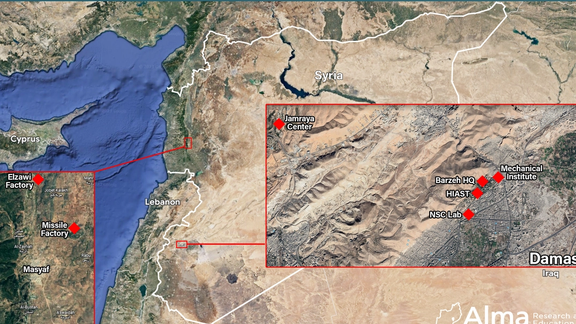
New research shows Iran’s investment into weapons plants in Syria continues, at the expense of the Iranian people suffering the worst economic crisis in decades.
Israel’s Alma, an institute focused on threats to northern Israel, has revealed in a detailed report that “Iran’s major focus is to develop and manufacture precision missiles and rockets, cruise missiles, and unmanned aerial vehicles (UAVs) on Syrian soil”.
Operations are centered around the CERS Center, which is the heart of Syria's military industry. Established in 1971, the institute has transformed into a collaborative platform involving Syria, Iran, and Hezbollah since the beginning of the civil war, according to Alma's statement.
Security monitoring has been intensified by the Quds Force and Hezbollah’s security unit in Syria, Unit 9000. Iran’s control has become almost absolute, with a full-time presence of senior IRGC Quds Force Officers at the site.
In 2020, it was revealed by a prominent lawmaker that Iran had spent between $20 billion and $30 billion in Syria to prop up President Bashar al-Assad and fight Islamic State but as revelations of Iran’s growing industrial capabilities continue, the true number is believed to be far higher.
“We have probably paid $20-30 billion to Syria, and we have to take that money back,” Heshmatollah Falahatpisheh, a member of the Iranian parliament's national security committee, said in an interview with Etemad Online at the time. Little has changed since, regime activities in Syria seeming to only step up, not down.
In May, Iran International reported that based on leaked documents from the Iranian foreign ministry, that Syria owes Iran $50 billion.
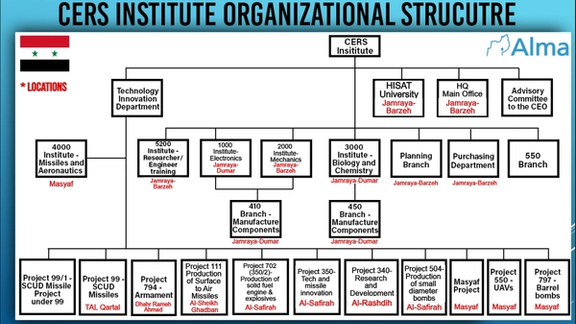
Iranians often express strong disapproval of the regime’s regional policy of establishing and supporting militant groups and its involvement in Syria, while inflation has surpassed 50 percent in Iran. The national currency has fallen 12-fold in the past five years and nearly half of the population lives below the poverty line. Slogans during nationwide anti-regime protests since 2017 have called for stopping aid to Hezbollah and Palestinian militants.
Over the years, Syria’s CERS Center has been shown to be accountable for the research, development, and military production of advanced weapons such as surface-to-surface missiles such as the M-600 / Fateh-110 missile, which is “at the heart of the joint Iranian-Syrian and Hezbollah precision project", Alma reported. More alarmingly, it states that “the CERS Center is responsible for developing and manufacturing chemical, biological, and potentially nuclear weapons”.
Alma believes Syria now “possesses extensive chemical capabilities,” which it believes to be “a guarantee of its survival”. More alarmingly, the researchers warn that it could be these very chemical weapons which pose the next greatest threat to Israel.
“At will, this capability may benefit the radical Shiite axis led by Iran in general and Hezbollah in particular. Hezbollah’s use of chemical weapons in the next confrontation with Israel cannot be ruled out.
“It is conceivable that missiles/rockets armed with chemical weapons (such as Sarin nerve gas) are being stockpiled for use by Hezbollah in one of the CERS center’s sites in the Masyaf area and will be transferred to Lebanon if so directed,” claimed Alma’s assessment. “We estimate with a high probability that in a situation of war, Israel will attack the chemical weapons stockpiles wherever they are, in Syria and/or Lebanon.”
Just last year, Syrian Prime Minister Hussein Arnous announced that he would welcome Iranian companies seeking to partner with economic institutions in Syria, under the pretext of serving the reconstruction process and carrying out investment projects.
Also last year, the Iranian minister of roads and urban construction visited Damascus where contracts were signed in the fields of transport, investment, petroleum products and infrastructure, all the while in Iran, thousands of citizens are still dying on the treacherous roads and suffering the consequences of its dire infrastructure.
Iranian economic expansion in Syria means giving Tehran the leverage to exercise control after the war, which means long-term influence in Syria, even without the need for a military presence.
This influence means that the regime can also be within shorter striking distance of its archenemy Israel, as was seen earlier this year when a multi-front attack saw Israel bombarded with rockets from Gaza, Lebanon and Syria as Iran’s wrath surrounded the Jewish state via its collection of proxy militias.
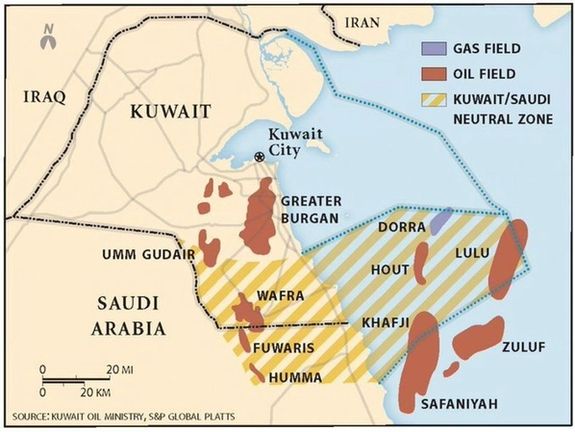
Saudi Arabia and Kuwait reaffirmed Thursday that they jointly own rights to a gas and oil field in the western Persian Gulf called Durra, also partially claimed by Iran.
The official Saudi news agency SPA cited the foreign ministry as saying that both countries are renewing calls for Iran to engage in negotiations on the demarcation of the eastern border of the Gulf's maritime "Divided Area," SPA said.
Saudi Arabia and Kuwait will negotiate as one party, with Iran acting as the other side in the talks "in accordance with the provisions of international law," the Saudi foreign ministry added.
Iran has previously said it has a stake in the Durra field and called a Saudi-Kuwaiti agreement signed last year to develop it "illegal."
Called Arash in Iran and Durra or Dorra by Saudi Arabia and Kuwait -- the offshore field was discovered in 1967 and is estimated to have a total proven reserves of around 310 million barrels of oil and 20 trillion cubic feet of gas.
Iran said on Sunday it would pursue its rights over the field if other parties shunned cooperation, a few days after Kuwait's oil minister said his country would start drilling and begin production without waiting for border demarcation with Iran.
“If there is no willingness to cooperate, Iran will pursue its rights and benefits, including the exploitation and exploration of the Arash gas field, and will not tolerate any violation of its rights,” Javad Owji said July 30.
Tehran re-established diplomatic relations with Riyadh in March after a 7-year period of tensions, but the dispute over the energy field can create new complications.

A member of the Iranian parliament's National Security and Foreign Policy Committee says government’s promise to free frozen cash in South Korea has led to nowhere.
During the past year, Iranian officials including President Ebrahim Raisi said several times that the assets were to be released soon. However, this has repeatedly proved to be a tactic to defend a crumbling national currency.
Lawmaker Shahryar Haidari told the press Monday that "If Seoul does not pay back Iran's oil money, we might have to severe Iran's ties with South Korea." However, he did not say what can Iran gain by cutting off its ties with South Korea.
Two Seoul banks hold $7 billion from imports of Iranian oil that are frozen due to US financial sanctions on Tehran.
The frozen funds have been the subject of long negotiations between Tehran, Seoul and Washington over the past two years, as the Biden administration launched talks with Iran in April 2021 to revive the JCPOA. Many reports and statements point to possible release of the funds in exchange for several US citizens held hostage in Iran.
Both the nuclear and the prisoner release talks have not made meaningful progress. However, US officials say that efforts to secure the release of four Americans continue. Apparently, one US condition is to set up a mechanism for the disbursement of the funds for purchasing only non-sanctionable goods by Iran such as food and medicine.
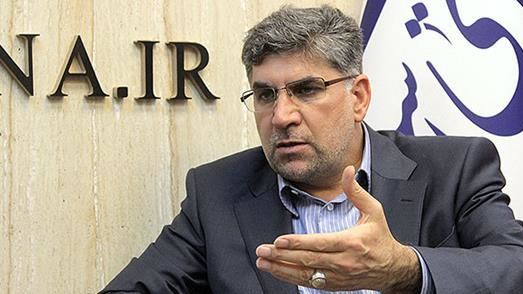
Haidari claimed that "Korea had promised to repatriate Iran's money via Oman. We accepted that solution, but the Koreans refused to send the money with various pretexts."
Iran’s government submitted a bill to parliament July 29 to approve sending the case of the frozen funds to arbitration.
Khabar Online website in Tehran wrote that $7 billion of Iran's oil money has been frozen in South Korea for four years, but despite Korea's willingness to continue its ties and trade with Tehran, it has not been able to return the money because of US sanctions.
Oman had offered to mediate between Iran, South Korea and the United States, but this has not been fruitful yet, apparently because Tehran and Washington have not reached a deal on releasing four Americans held in Tehran.
Iran badly needs hard currency to solve at least part of its daunting economic problems, which have given rise to political instability, including protests and strikes across the country.
In another development, former lawmaker Iraj Nadimi told Nameh News website that the government is under pressure by the people who ask if they have really sold a lot of oil and if Iran's frozen assets have been released why they cannot see its impact on the economy.
Nadimi stated that it is a legitimate demand by the nation to improve their living standards. They should know where Iran’s money is if frozen assets in Iraq and South Korea have been released. The US in June allowed Iraq, which also hold frozen funds to release $2.7 billion, but only to be used for non-sanctionable payments, meaning essential needs.
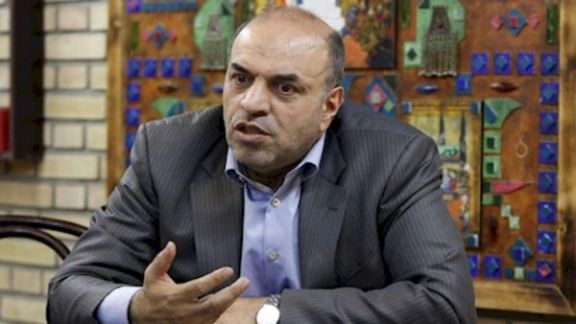
The Iranian government made a lot of fuss during the past two weeks by claiming that part of Iran's assets in Iraq was released and is now in Oman.
Meanwhile, Faraz daily website also questioned the government's claim and sarcastically asked: "Haven't the frozen assets been released?" The website further stressed that the government's announcement about filing a complaint and referring the matter to arbitration reveals that it has been lying to the nation so far about those assets.
In another development, Alaeddin Borujerdi, the Chairman of the Sino-Iranian Friendship Association, denied that Iran has frozen assets in China too. He claimed the two countries' central banks coordinate payments.
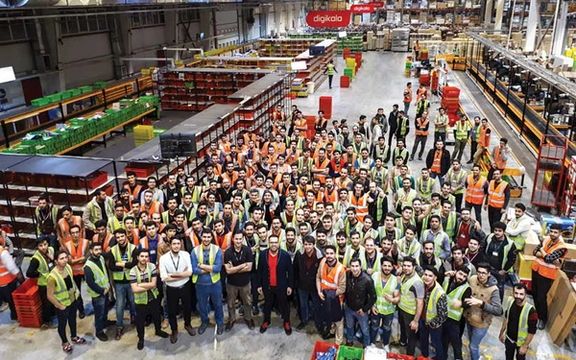
Days after several online shopping platforms were shut down by the Iranian government over lack of hijab, the Judiciary claimed it had no role in the decision.
Several online shopping platforms including online bookshop Taghcheh, online retailer Digikala, and marketing platform Azkey were shot down during the past few days not for their operations, but for the way their employees dressed in photographs posted on social media platforms.
The statement by the Judiciary Spokesman Massoud Setayeshi revealed the chaos surrounding the way the government enforces compulsory hijab and controls online businesses and social media platforms.
Setayeshi said that the Judiciary has never issued any order for the closure of online or other businesses. However, he confirmed that court cases have been launched for the online businesses about their employees’ hijab.
Meanwhile, adding to the confusion, Communications Minister Isa Zarepour also told the press on Tuesday that his ministry was not involved in the closure of online businesses. He said, “closure of a platform is not the right way to confront the employees.” Zarepour made it clear that “the right thing to do is confronting the employees," not punish the companies
Some of those platforms such as Digikala have tens of thousands of employees, subcontractors and businesses that supply the merchandise. Moderate website Rouiydad24 wrote in a report on Tuesday, “If we are involved in an economic war as the country’s officials say, why are you crippling people’s livelihood by shutting down online businesses?”
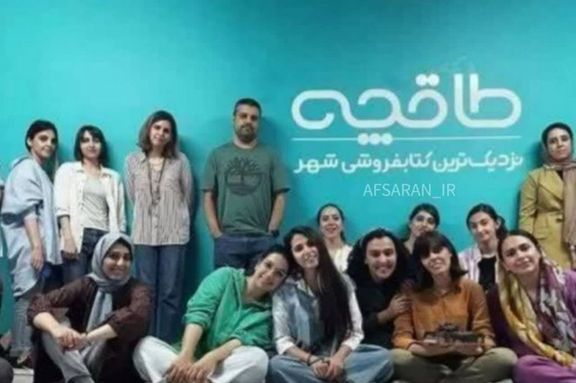
Donya-ye Eqtesad (Economic World) daily said: “The closure of online businesses affect thousands of their employees, providers, contractors and others involved in the business.” The daily further asked why platforms should be closed when the economy is the country’s biggest problem? Donya-ye Eqtesad also questioned the approach that widens the crisis of enforcing the compulsory hijab by extending it to online business, platforms and applications.
The daily went on to argue that “The people are the country’s most valuable asset. By making them unhappy, the expert workforce is likely to leave the country in a situation when we need them most.”
The daily also warned that the closures will do harm to the digital industry, which is the only growing sector in Iran’s economy.
Meanwhile, former Vice President Es’haq Jahangiri told reporters that the closure of online businesses threatens the private sector. He added that shutting down online businesses for hijab is like throwing a stone at a bunch of sparrows which also makes other sparrows flee.
He said this approach is worrying. While the production and services sectors are suffering from the current economic crisis, endangering their existence by shutting down online platform will make the private sector angry. He added: “The private sector needs security for its capital.”
Following the denials by various officials about their involvement in the closure of businesses, social media users noted the chaos in handling hijab and online activities in Iran and wrote that no one in the government is brave enough to accept responsibility for harsh measures. Some media outlets have quoted government spokesman Ali Bahadori as saying that President Ebrahim Raisi was unhappy about the decision to shut down those businesses, but he was not observed to say anything in public about the situation.
In the meantime, the identity of powerful state organs who had closed down online platforms remains a mystery.